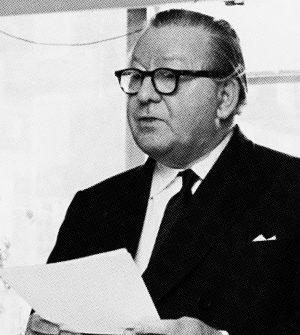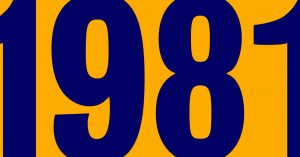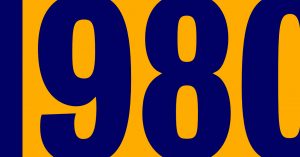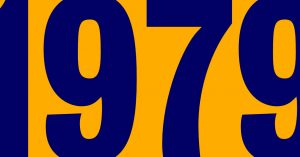ATV financial results: 1970
Lord Renwick on Associated Television Corporation’s 1970 results

“The consolidated Profit and Loss Account shows a profit for the Group before Levy and taxation of £10,169,000 [£132.6m in today’s money allowing for inflation – Ed], a decrease of £873,000 [£11.4m] from last year. After £4,534,000 [£59.1m] for Levy and £2,426,000 [£31.6m] for taxation, the Group profit is £3,209,000 [£41.8m], which is £96,000 [£1.3m] more than last year.
The Board has decided to recommend a final dividend of 16%, making the total distribution for the year 28.5%. The rate of distribution last year was 28.4625%.
After providing for this dividend, the balance of £1,151,000 [£15m] is carried forward to Reserves. Shareholders’ Funds are £26,350,000 [£343.6m], compared with £24,238,000 [£316m] for 1969.”
Taken from the Director’s Report.
“Altogether a most excellent year….”
The Fifteenth Annual General Meeting of Associated Television Corporation Limited was held at ATV House, Great Cumberland Place, London, W.1. on 24th September, 1970, at 12 noon.
The following are extracts from the Statement by the Chairman, Lord Renwick of Coombe, KBE, for the year ended 29th March, 1970:-
Not only is the Group profit (after levy but before taxation) of £5,635,000 [£73.5m] the fourth highest in ATV’s history, but this outstanding result has been achieved despite the fact that the profit from your television subsidiary, ATV Network, has fallen away by no less than £2,152,000 [£28.1m].
In short, the Corporation’s long pursued policy of planned expansion in the entertainment industry is now reaping the reward of earlier long-term investment, and the warning in my last Annual Report of the impending unhealthy state of Independent Television has been sadly kustified.
I will deal later with the causes, mostly foreseeable but unfortunately beyond the Board’s control, of the current decline in the television Industry. For the moment I will confine myself to those aspects of the Group where there is every indication of continuing prosperity.
FILMS. First must come film production and distribution which contribute no less than 41% to the Group profit. The success in this sphere of your subsidiary companies, Independent Television Corporation of America and Incorporated Television Company Limited of England, represents an altogether remarkable personal achievement on the part of the Group’s Chief Executive and Managing Director, Sir Lew Grade. Until the mid-sixties, British-made television production was regarded as virtually unsaleable in the United States. The degree to which a transformation has occurred may be judged from an article in the April issue of America’s leading entertainment journal, “Variety.” I will quote the opening paragraph;
“Sir Lew Grade may do single-handedly to American television what it took four strapping Liverpool boys to do to American popular music. The British video impresario, who heads Associated Television there, is all by himself the first major foreign influence in the hitherto all-American tele industry.”
MUSIC. Equally gratifying have been the results of ATV’s expansion into music publishing. With the acquisition of Northern Songs, which owns the musical copyrights of Lennon and McCartney, your Corporation now possesses a commanding property. Profits of Northern Songs for the eleven months to the end of March, 1970, considerably exceed the profits for the preceding full year, and the volume of business is steadily increasing.
Taken in conjunction with Pye Records, which continues to hold an important and growing position in the international disc market, ATV’s operations in music and records are now firmly and broadly based. The profits from this division amount to 32% of the Group’s total.
THEATRES. ATV’s theatrical interests are of key importance within the Group, and the Stoll Theatres Corporation and its subsidiary, Moss Empires, under the chairmanship of Mr. Prince Littler, have once again enjoyed a good year. I am pleased, moreover, to be able to report that results for the current year are substantially better than for the year under review.
Transdiffusion analysis
The Television Advertising Levy continues to wound ITV in general and ATV in particular, even with a reduction due to it having become too punishing during a period of economic turmoil for the entire country. There’s a very circular argument in play over it. ITV has a monopoly on broadcast advertising because the government is committed to preventing the expansion of commercial broadcasting. But that monopoly, like all monopolies, means that there will be huge profits for the holder of the monopoly. Therefore the government decides to take a large slice of that profit because it is unearned – it only exists because of the monopoly they themselves have decreed. That taxation drives up the cost of broadcast advertising as much as the monopoly does.
ATV’s solution to this has long been ITV-2. A second commercial network would end the monopoly, end the reason for the Levy and produce better television (that part at least is questionable). With a market for advertising being created in place of the monopoly, the cost of advertising on television should go down whilst profits should go up (charging more people less money is inherently better business than charging less people more money). If advertising sales go up, and across the two networks they should simply because there are two networks rather than one, then the Treasury still reaps the benefit through ordinary taxation without having to intervene and grab advertising cash as it comes in through the door. But that involves more commercial broadcasting and the government of the day remains resolutely opposed to that happening.
Renwick’s date of 1971 for the collapse of ITV under this regime was never tested, but it seems unlikely. What might have happened was the slow collapse of one of the ‘minors’ like Border or Grampian or Westward, and maybe a heavy retrenchment at one of the ‘major-minors’ like Anglia or Harlech. In that case, ITV programmes would not stop, just as they hadn’t when Teledu Cymru failed in the 1960s. A neighbouring company would be invited to step in, either temporarily until a new franchisee could be found or permanently with a redrawing of the regions concerned. It is unlikely that any existing contractor would be unwilling to do this, but there might be a collapse in confidence by advertisers. But even if that did happen, ITV would still have its monopoly and the system would continue, albeit as a smaller one.
CRISIS IN THE TELEVISION INDUSTRY
In July, 1969, the rate of Turnover Levy was increased to a level calculated to extract a further £3 million from the industry. This, as I had already given warning would happen, immediately produced a crisis which changed the whole financial structure of Independent Television and endangered the very existence of some companies not protected by diversified operations.
In April, 1970, the Turnover Levy rate was amended to provide for a remission of £5 million. This purely stop-gap relief was, however, offset by the fact that over the year 1969/70 national television advertising revenue had itself declined by some £5 million. This decline is symptomatic of the state of the country’s economy. It is not possible to forecast the date by which the Government will feel able to take measures to raise, rather than to depress, the level of domestic spending upon which all domestic advertising depends. What is possible to forecast is the date by which the Independent Television industry will find itself unable to finance its increasingly costly operations. This date is 1971.
TURNOVER LEVY. Clearly, the Turnover Levy, which is imposed on revenue, and is required to be paid before meeting operational expenses and before paying Corporation Tax on profits (if there are any), should be abolished altogether leaving the Television Companies to make their contribution to the Exchequer entirely through Corporation Tax in the usual way. This would remove the invidiousness of a discriminatory levy imposed upon a single industry, and would place Independent Television upon an equal footing with all other commercial operations. On this basis – and on this basis alone – can the return both to shareholders in Independent Television Companies and to the Exchequer be made fair and equitable.
BROADCASTING HOURS. Because of the limitation on broadcasting hours, ATV Network alone is denied extra revenue of not less than £½ million [£6.5m] per annum. Any review of Independent Television must take into account the effect on the industry of the new major franchise — Yorkshire — granted by the Authority in 1968. While we welcome this recognition of Yorkshire’s independent status, it cannot be overlooked that the introduction of a fresh contributor to the Independent Television network has meant that other contributing companies have been left with considerable under-utilized studio facilities.
The redistribution of franchises in 1968 brought with it, moreover, heavy capital demands on some companies for the provision of new studios. ATV Network’s own development in Birmingham, for example, has called for some £6 million [£78.2m]; and this capital investment comes on top of some £1.5 million [£19.6m] previously required for the conversion of ATV’s Elstree studios to Colour on the 625-line standard.
Finally, rising costs — not least labour costs – within the industry continue to erode and, in many instances, entirely erase the narrow margin of profit which remains after the payment of the Levy.
AWAITING GOVERNMENT ACTION. The Independent Television Authority is no less concerned than the companies at the gravity of the situation which has arisen, and all the figures for the industry have been submitted for investigation by the Prices and Incomes Board. It is not too much to say that the whole future of Independent Television now depends action by the Prices and Incomes Board, the Chancellor of the Exchequer and the Minister of Posts and Telecommunications.
MANAGEMENT AND STAFF
On behalf of the Board, I pass on my thanks and appreciation to members of the Management and Staff at all levels.
About the author
As a public company with shareholders, ATV was required to publish a detailed Annual Report at the end of each financial year. It was common to also publish a Chairman's Statement, summing up the report in more readable language.





